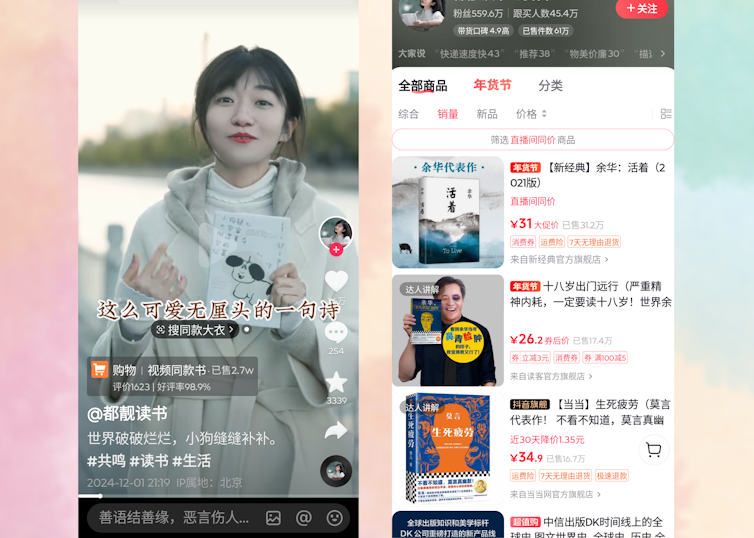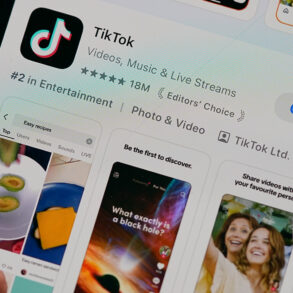While the Australian book market was down 3% last year, genre fiction – popular on BookTok – was among the rare categories that grew.
Since 2020, BookTok has been increasingly influential in how people (especially young people) read. Books popular on BookTok were among the top ten bestselling Australian titles of 2024. Colleen Hoover’s 2016 novel It Ends With Us (also a 2024 film) was fourth, with Sarah J. Maas’ A Court of Thorns and Roses (2015) and Rebecca Yarros’ Iron Flame (2023) the next highest-selling novels, in sixth and seventh place.
In China, one of the world’s largest book markets and most digitised nations, social media is influencing what (and how people read) in new and evolving ways – through two super apps.
Douyin, the Chinese version of TikTok, is the nation’s third most popular app, at 900 million monthly active users. Its version of BookTok is even more influential than its Western counterpart. Douyin integrates online sales directly into its platform, allowing publishers to pay for promotions and influencers to earn commissions on the books they sell.
WeChat, China’s most popular app, at over 1.3 billion monthly active users, is integrating ebooks and social reading into the platform. This not only effectively encourages public reading, but boosts app usage and strengthens WeChat’s central role in Chinese people’s digital life.
Douyin: buying books in the app
Publishers are still grappling with how to navigate the reader-led dynamic of “social reading”. Traditionally, book sales are partly driven by publishers promoting their books to audiences. But BookTok is more organic, largely relying on readers sharing and recommending books to one another. While some influencers are sponsored by publishers, the average person on BookTok isn’t being paid. In China, though, there are more commercial opportunities for book creators and influencers to earn income on social media.
Book discussions on Douyin share similarities with BookTok – such as short video formats and enthusiastic communities. But they go much further, by embedding the ability to buy books online. On Douyin, popular book-related videos don’t just generate interest: they include links for viewers to instantly buy featured books. It only takes a couple of taps to add books to users’ carts. Online creators can earn a commission in the process.

Xiang Ren
Douyin’s algorithm, which promotes engaging content regardless of follower count, has empowered many creators – and even ordinary readers – to share their reading experiences, while gaining visibility and sometimes income. In fact, influencers with follower counts between 10,000 and three million contributed to over 70% of total book sales on Douyin.
Douyin’s livestreaming e-commerce is also deeply changing how Chinese people buy books. Popular influencers host hours-long live sessions to sell various products while interacting with audiences in real-time – books being one of the most popular categories. The book-themed livestreaming that seamlessly blends reading, social entertainment and online shopping, becomes highly engaging to readers. Influencer endorsements and exclusive discounts make these events effective in driving book sales.

For example, Chi Zijian’s literary novel The Last Quarter of the Moon, which explores the life of an Evenki woman and the cultural transformation of her Indigenous, nomadic community in 20th-century China, had been promoted by influencer Dong Yuhui in his livestreaming shows and short video content since 2022. The book
saw sales skyrocket from 600,000 copies over two decades to more than five million in recent a couple of years.
Dong Yuhui, one of the most popular influencers on Douyin, was previously an English teacher but rose to fame as a livestreaming host. He is now affiliated with an e-commerce company. Influencers like him operate more like an online bookstore, negotiating big discount from publishers rather than relying solely on advertising fees or commissions.
Douyin has changed how books are sold in China. In 2023, short video platforms occupied 26.6% of the book market share. Physical bookstores accounted for just 12%.
BookTok in countries like Australia, the US and UK often focuses on young adult and genre fiction. But books sold on Douyin span a much wider range, including children’s books, educational titles, self-help and literary books.
WeChat is reimagining social reading
WeChat is a “super sticky app” that has been dubbed the “Swiss army knife” of social media for its versatility. It’s a communication and messaging platform, but also has dedicated functions that allow users to do things like paying bills and shopping online.
WeChat has also entered the field of digital reading. WeRead (also known as WeChat Reading) was launched in 2015, with the slogan “making reading no longer lonely”. It leverages WeChat’s existing networks of trust and intimacy to foster a distinctive approach to social reading. With over 200 million active users, WeRead encourages reading as a communal activity.

Xiang Ren
WeRead employs a gamified approach to create incentives for engagement. Users earn points and unlock free ebooks by completing tasks such as sharing highlights, posting comments, gifting books and participating in individual or group reading challenges. This strategy practically allows many readers to access site-wide ebooks for free, albeit only for limited periods, which may last just days or weeks. An annual unlimited reading subscription costs about A$40.
Popular ebooks on WeRead highlight the platform’s unique focus on networking through people they know. Acclaimed novels such as Cixin Liu’s The Three-Body Problem, Khaled Hosseini’s The Kite Runner, and To Live by Yu Hua are among the top bestsellers, along with topical titles or classic literature. These are the kinds of books readers might proudly share with their boss, colleagues, or family to reflect their tastes and values.

While WeRead offers free ebooks to many users, it does so without relying on advertising. Instead, it operates with subsidies from Tencent, the company that owns WeChat. In return, WeRead brings significant value to its parent company by driving app usage, gathering user data, and strengthening WeChat’s dominance in China’s digital landscape. This model shows digital reading can generate economic benefits beyond direct ebook sales or advertising.
The future of books
Douyin’s BookTok and WeChat’s WeRead are transforming reading books into a deeply social, interactive experience. Douyin’s discounts and WeRead’s free ebooks also makes books more accessible. They effectively promote reading among wider audiences.
For publishers, these platforms offer new opportunities to market books and connect with readers. A growing number of Chinese publishers are creating their own accounts on Douyin to promote and sell books, leveraging social reading dynamics to achieve sales levels previously unattainable through traditional channels.
However, concerns remain over the growing power and influence of tech giants. Critics worry Douyin’s focus on discounts and influencer-driven trends may undermine the value of books, potentially threatening the long-term sustainability of the publishing industry. Not only might readers be encouraged to buy books they are not genuinely interested in, but they may also expect books should always be cheap or free. Some users have concerns about privacy. Some users even sued WeRead for infringing their personal information, prompting Tencent to adjust its data collection processes.
Despite these concerns, the deep integration of social networking, online sales and digital reading in China points towards a book world that is led by readers and centred on social media platforms. Could “social reading”, as shaped by China, become a wider trend?
These innovations undoubtedly stem from China’s unique conditions: the domination of super apps and its vibrant mobile reading culture. But they provide a vision of what the future of reading may look like: deeply connected with social networking and digital life. And a book business that is increasingly linked to social media – even becoming an integral part of its ecosystems.







